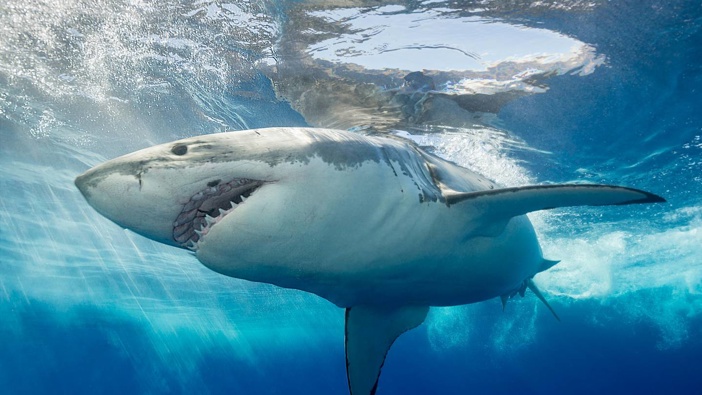A shark expert believes more people being in the water is the likely reason behind the number of shark sightings this summer.
Swimmers at an East Auckland beach today were warned to take care after sharks were spotted, and another shark warning is in place at a west coast beach. Last month, 19-year-old Kaelah Marlow died after apparently being attacked by a shark at Waihī Beach in the Bay of Plenty.
Marine scientist and shark researcher Riley Elliott said the increased number of sightings is not surprising, despite their populations declining.
He said there are far fewer sharks than previously, but a lot more people are going into the water than before.
"We cannot blame sharks for us encountering them more, we can only blame ourselves, we can only educate ourselves and we can only understand the environments that we go into and accept the risk if we're going to go into them."
But Elliot said every tragedy as a result of a shark needs to be investigated so we can learn from our mistakes.
"It should be recognised because we don't want this to continue, you need to learn from these, you need to react from these tragedies."
Elliott said it's vital to distinguish science from personal observations.
A major international report in the journal Nature a few weeks ago indicated that worldwide shark numbers have declined 70 per cent over the past 50 years because of an 18-fold increase in fishing pressure, he said.
"That is absolute scientific fact, so we have only 30 per cent of the world's sharks left and that is a huge decline."
Elliot said many reports in the media or from fishers are personal observations.
"I'm looking at a couple here right in front of me saying 'because we stopped shark finning there's sharks everywhere'. That's personal observation."
Elliot said that does not count as fact or science.
"But when we have a unique tragedy like the unfortunate one in Waihī from a suspected white shark - that stands out as an anomaly that we should be looking into because statistically and scientifically great whites in that area have not been a common thing."
He said last year great whites were sighted off Bowentown in Tauranga and one reportedly bit a surfer's board at Pauanui beach.
At this stage these are anomalies that are not yet statistically significant, he said.
"But any tragedy is statistically significant in my eyes as a shark biologist."
Australia's shark population
Elliot said Australia needs to be broken into two distinct areas in terms of shark attacks.
"West Australia has quite a lot fewer shark attacks but they're almost all fatal, whereas the east coast of Australia had, I think, 88 in the past 10 years, but a very small proportion of those are fatal."
He said on the west coast, mature sharks are hunting seals, and their hunting grounds overlap with areas surfers are.
"You just get a full-blown predatory attack, which results in fatalities because these people are also far from medical help."
Elliot said there is a much larger population of smaller great whites on the east coast of Australia because estuaries and shallow water coastal systems make good nurseries.
"You get a lot of nips, a lot of these young juvenile sharks don't really understand what's going on yet, their diet shifting from fish to mammals, being seals not us, and they make mistakes."
Elliot said the east Australian sharks are part of New Zealand's shark population. Most of this country's shark population hunt around the southern islands.
But he said the sharks that have been seen in the North Island are juveniles.
"These live in our northern harbours, they get above two and a half metres and they shift their diet from fish to seals and they start moving down the coasts or they start migrating."
Elliot said he is curious and concerned to see whether New Zealand ends up with a more juvenile sharks, which potentially leads to increased encounters.
He said there have been low numbers of shark fatalities in New Zealand in the past decade.
"So it's nothing to panic about but it's something that requires investigation for sure."
He said juvenile great whites have been protected since 2004 and that protection should lead to a growth in the population.
"But we've also increased fishery by-catch rates in that time: fatalities of juvenile great whites has been 53 over the past eight years, I believe, and that's just what's reported."
Elliot said there is very little data on shark numbers, but useful information could be gleaned from fisheries if they were forced to better report their catch.
"The bottom line is unless the government starts allocating money to start researching this stuff [and] to enforce fisheries to better report their catch, we have no data."
Elliot said without that it is impossible to tell great white numbers and to ascertain whether they have "moved in their habitat and their behaviour".
text by RNZ
Take your Radio, Podcasts and Music with you










